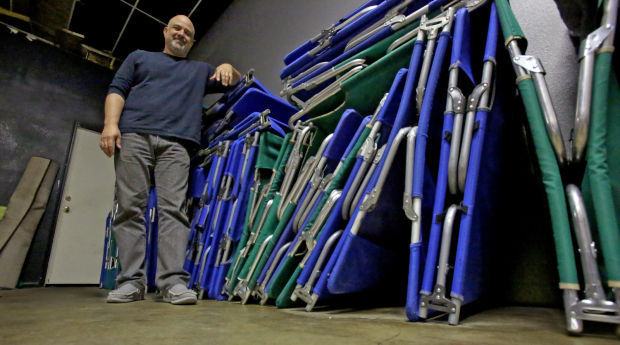For four days and three nights, Davide Ferrari, the pastor of Central City Assembly, took to the streets.
As part of his desire to help Tucson’s homeless, Ferrari spent the last weekend in June living with them.
When the sleeping pods were removed from downtown sidewalks in March, Ferrari’s church Central City Assembly, 939 S. 10th Ave., opened a temporary shelter as part of a city contract. That ran out in June, and the shelter closed.
Now, Ferrari wants to reopen it with 50 beds for men and eventually 25 for women. With projected expenses at $100,000 annually, this “low-demand” shelter would help those that many facilities turn away — for example, someone struggling with active drug use, Ferrari said.
The plan to open Sunday, July 26, may stall as Ferarri discusses safety concerns with surrounding neighborhoods. He is working with the city, the Police Department and neighbors to find a compromise.
The homeless community is one that Ferrari knows. His church started serving hot meals about eight years ago and has hosted an emergency shelter on its campus during winters for almost as long.
During his time on the streets, Ferrari was accompanied by Tucson activist Jon McLane and several others.
The Star spoke with Ferrari about his weekend without a roof over his head. Here is an edited version of the interview:
How did you prepare for this?
A: “There was an element of psyching myself up for it, and there was a little bit of fear involved. I packed up a backpack a half-hour before to try and make it as real as I could, because it would never be a genuine experience. I went into it well-fed and healthy, and knowing when the end was was such an emotional benefit that I had. When I got tired or depressed, I knew I just had to make it through Sunday.”
What did you take?
A: “One clean shirt, one clean pair of undergarments, a toothbrush and toothpaste, a charger for my phone and a sleeping bag and pillow.”
How did you spend your time?
A: “A lot of our time was spent walking, which we probably walked more than the average homeless person. I wanted to get around and see the different services available. ... We probably walked 12 or 13 miles the first day and 10 miles the second day. ... Most of the time was spent trying to find where we could get food from and how we would get water. ... A good part of the day was spent staying cool in the library.”
Where did you sleep?
A: “I went into it knowing that would probably be a big issue, but it was a much bigger issue than I anticipated. ... I got absolutely no rest for three nights. ... I can’t tell you how many times someone passed by and honked just to wake us up or yelled obscenities while driving by, and it just makes it impossible to rest. ... I made sure that I was not going to break any laws while out there, and I didn’t do this to make a political stand, but the only place I could sleep was on the sidewalk downtown. ... I went in thinking I would camp in the riverbed if I was truly homeless, but after touring the wash, there was no way I would be caught dead down there. It’s not a good environment.”
What was most surprising to you?
A: “There wasn’t as much trouble downtown as I would have anticipated. My impression was that in the culture of homeless people, the thug element is what I would find downtown, and that was there, but it was very small.”
In what ways did you see problems perpetuated?
A: “There was a bit of violence. There were people who were drunk or high or whatever, and there were some violent outbursts that I saw. I smelled some drugs, but I didn’t actually see any drug deals. I talked to people about it, and I’m sure because I am who I am, they’re careful. The thing that was most disturbing was the violence and potential for violence. Someone ticks someone off, and they’re throwing punches.”
What motivates you to help in this area?
A: “That comes from my relationship with Jesus Christ. I’m compelled by my faith to help those who are in need and try and minister to those who need ministry.”
Big takeaways?
A: “The majority of these folks are struggling in the cycle of addiction or mental illness, and if you could look them eyeball to eyeball, you would want to help them.”





